GALLUP NEWS SERVICE
PRINCETON, NJ -- A new CNN/USA Today/Gallup survey finds a significant drop in support for the new Medicare prescription bill that Congress narrowly passed last November and the president signed into law in December. More seniors now oppose than support the law, a reversal from last December. Only about a third of all Americans believe the law will help seniors pay for their prescriptions, and only 18% believe it will help the financial security of the Medicare program itself. A plurality of Americans reject the charge that President George W. Bush deliberately misled the public on the program's costs, but only 35% approve of the way he has handled the Medicare issue more generally, while 55% disapprove.
The poll, conducted March 26-28, shows that 41% of Americans favor and 35% oppose "the new Medicare law that deals with prescription drug benefits for senior citizens and changes the way Medicare will cover the medical expenses of some senior citizens." Last December, a few days before the bill was signed into law, a majority favored it by a margin of 52% to 30%.
| General Public: Attitudes About New Law Providing Prescription Drug Benefits to Seniors |
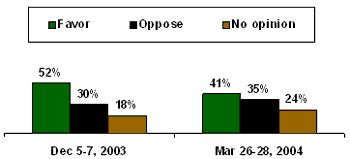 |
Support has declined among all age groups, but the change is particularly significant among seniors -- people aged 65 and older -- who are the principal beneficiaries of the new law. Last December, seniors favored the new law by 46% to 39%, but now they oppose it by 48% to 36%.
| Seniors Only: Attitudes About New Law Providing Prescription Drug Benefits to Seniors |
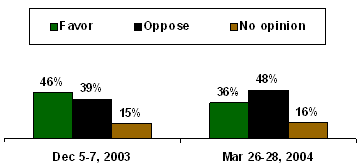 |
Support for the bill declines with age. Young people (aged 18 to 29) favor the law by 46% to 27%, a 19-point margin. The next two age groups show more support than opposition by 7 percentage points among the 30 to 49 age group, and 11 points among the 50 to 64 age group. Seniors oppose it by a 12-point margin.
| Attitudes About New Law Providing Prescription Drug Benefits to Seniors by Age |
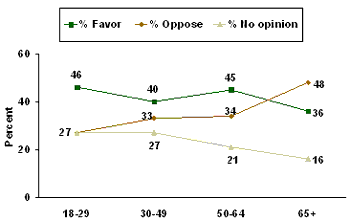 |
| March 26-28, 2004 |
The poll shows that few people (35%) believe the new law will help seniors pay for their drugs, while 30% say it will have little effect and 20% believe it will actually hurt seniors. Another 15% have no opinion.
|
Effect of new Medicare law: |
Help |
Not have |
|
No |
|
To assist seniors to pay for prescription drugs |
35% |
30 |
20 |
15 |
|
To solve problem of making Medicare financially secure |
18% |
37 |
28 |
17 |
Similarly, only 18% believe the new law will help make the Medicare program financially secure, 28% say it will hurt, and the plurality (37%) says it will not have much effect.
These views are related to age, with older people generally more skeptical than younger people are. Thirty-eight percent of the youngest Americans say the law will help seniors pay for prescription drugs, while only 26% of seniors express that view. The pre-retirement group (aged 50 to 64) is the most optimistic, with 41% expecting the law to help.
| Will Medicare Law Help -- by Age |
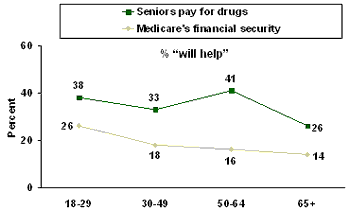 |
| March 26-28, 2004 |
Younger people are also more optimistic than older people are that the new law will help make Medicare financially secure. Still, only 26% of 18- to 29-year-olds are optimistic, compared with 14% among the oldest group.
Costs of Medicare Prescription Drug Benefits
When Congress was deliberating the Medicare bill's prescription drug benefits, congressional estimates for the cost of the program were about $400 billion. Earlier this month, a Medicare official charged that a more realistic estimate was about $530 billion, and that his boss ordered him not to share that information with Congress.
In the wake of that controversy, the poll shows that 40% of Americans believe the Bush administration "deliberately misled the American public about the costs of the new Medicare law," while 46% disagree.
Younger people are the most likely to believe there was a deliberate deception, with 47% saying there was and 40% saying there was not.
| Did Bush Deliberately Mislead Public About Costs of Medicare Law? by Age |
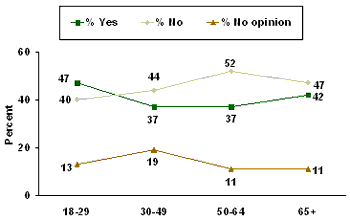 |
| March 26-28, 2004 |
The older age groups are more likely to give the Bush administration the benefit of the doubt, with the pre-retirement age group the most supportive -- 52% say no deliberate deception, while 37% say there was.
Despite the (mostly) free pass on deliberate deception, most Americans are not satisfied with the way Bush is handling Medicare in general. Overall, 55% disapprove, while only 35% approve.
| Bush’s Handling of Medicare
Issue by Age |
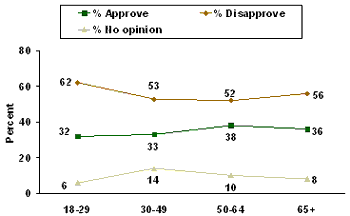 |
| March 26-28, 2004 |
Majorities of all four age groups disapprove of the president's handling of Medicare, with the youngest group (18 to 29) the most negative (by a 30-point margin), and the pre-retirement group (50 to 64) the least negative (by a 14-point margin).
Survey Methods
Results are based on telephone interviews with 1,001 national adults, aged 18 and older, conducted March 26-28, 2004. For results based on the total sample of national adults, one can say with 95% confidence that the margin of sampling error is ±3 percentage points.
In addition to sampling error, question wording and practical difficulties in conducting surveys can introduce error or bias into the findings of public opinion polls.
23. As you may know, there is a new Medicare law that deals with prescription drug benefits for senior citizens and changes the way Medicare will cover the medical expenses of some senior citizens. Based on what you have heard or read, do you favor or oppose the new prescription drug benefit for Medicare recipients?
|
Favor |
Oppose |
No opinion |
|
|
% |
% |
% |
|
|
National Adults |
|||
|
2004 Mar 26-28 |
41 |
35 |
24 |
|
2003 Dec 5-7 |
52 |
30 |
18 |
|
Age 65 and Older |
|||
|
2004 Mar 26-28 |
36 |
48 |
16 |
|
2003 Dec 5-7 |
46 |
39 |
15 |
24. Which of the following best describes your view of what the changes to Medicare prescription coverage will do to assist seniors who have problems paying for prescription drugs – [ROTATED: it will help the situation, it will not have much effect, or it will hurt the situation]?
|
Help |
Not have |
|
No |
|
|
2004 Mar 26-28 |
35% |
30 |
20 |
15 |
25. Will it [help the situation/hurt the situation] a lot, or a little?
COMBINED RESPONSES (Q.24-25)
|
|
|
Not |
|
|
|
|
|
2004 Mar 26-28 |
10% |
25 |
30 |
5 |
15 |
15 |
- Which of the following best describes your view of what the changes to Medicare will do to solve the problem of making the Medicare system financially secure for the future – [ROTATED: it will help the situation, it will not have much effect, or it will hurt the situation]?
|
Help |
Not have |
|
No |
|
|
2004 Mar 26-28 |
18% |
37 |
28 |
17 |
27. Will it [help the situation/hurt the situation] a lot, or a little?
COMBINED RESPONSES (Q.26-27)
|
|
|
Not |
|
|
|
|
|
2004 Mar 26-28 |
7% |
11 |
37 |
10 |
18 |
17 |
28. Do you think the Bush administration deliberately misled the American public about the costs of the new Medicare law, or not?
|
Yes, deliberately |
No, |
No |
|
|
2004 Mar 26-28 |
40% |
46 |
14 |
